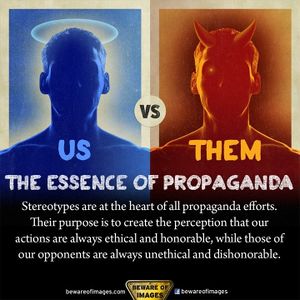Difference between revisions of "Demonization"
(much more discussion adapted from lessons learned on MLW; article now ready for primetime) |
("us vs. them" poster; some SMW) |
||
| Line 1: | Line 1: | ||
| − | + | <hide> | |
| − | [[category:manipulative tools]][[category:power structure tools]][[Demonization]] is a [[manipulative tool]] which unifies the speaker's group by blaming its troubles on another group, towards which all ire can be safely directed. | + | [[page type::article]] |
| + | [[thing type::concept]] | ||
| + | [[category:manipulative tools]] | ||
| + | [[category:power structure tools]] | ||
| + | </hide> | ||
| + | [[File:YD7bH.jpg|thumb]] | ||
| + | ==About== | ||
| + | [[Demonization]] is a [[manipulative tool]] which unifies the speaker's group by blaming its troubles on another group, towards which all ire can be safely directed. | ||
It is a technique used by [[power-broker]]s for effecting political change without going through appropriate political channels -- thus avoiding the [[accountability]] which is normally associated with such channels and which might therefore make those actions more difficult to accomplish that way. | It is a technique used by [[power-broker]]s for effecting political change without going through appropriate political channels -- thus avoiding the [[accountability]] which is normally associated with such channels and which might therefore make those actions more difficult to accomplish that way. | ||
Revision as of 00:35, 28 May 2012
About
Demonization is a manipulative tool which unifies the speaker's group by blaming its troubles on another group, towards which all ire can be safely directed.
It is a technique used by power-brokers for effecting political change without going through appropriate political channels -- thus avoiding the accountability which is normally associated with such channels and which might therefore make those actions more difficult to accomplish that way.
In more colloquial terms, it is a way for the powerful to get what they want without getting their hands dirty.
Characteristics
Due to the strong negativity of the word "demonization", it is often used as a way of shutting down legitimate criticism. It is therefore important to define both what it is and what it isn't.
It generally includes all of the following:
- some form of rhetorical deception:
- emotional manipulation substituted for sound reasoning, or
- erroneous premises asserted as fact
- target falsely portrayed as a major threat
- this disinformation is widely spread
- calling for circumvention of proper due process
Although demonizing speech may use the words "justice" or "fair", this is always in the context of calling for actions that are retributional rather than fair or justice-seeking. If an accusation concludes with a true call for justice, including all the due process thereof, it is not demonization.
Qualifiers
Note the first requirement; accusations cannot constitute demonization if they are true. For instance, it would not be demonization to describe Nazi detainment centers as "death camps" or to say that Hitler was evil.
Although demonization is primarily a tool used by the powerful, it can also be applied within smaller contexts. For instance, if one person on a discussion forum falsely tries to convince others that some group or individual (on or off the forum) is malicious (or evil) and that some action should be taken, the former is arguably demonizing the latter on that forum.
As a Criticism
Using "demonization" as a legitimate criticism is difficult; a much better charge to lay is to show specific examples where the target has taken harmful actions. See Issuepedia:Arguing for guidelines. It's best to use this term only when you have a set of examples ready to point to. Otherwise, less loaded phraseology such as "shows a pattern of false accusations against" or "regularly claims that [target] should be [form of retribution] using false data and bad reasoning".
Edge Cases
There are some edge cases, like the LDS/Catholic campaign against gay marriage which led to the passage of Proposition 8; although action was taken through purely legislative channels, it was also pretty clearly demonization:
- it removed rights which had been explicitly granted by prior state law, which had been passed through due process
- it went against the larger law of the US Constitution in that homosexuals were singled out for deprivation of specific rights granted to others
- logistically, it involved a coalition of people from outside a jurisdiction joining their resources to influence a vote within that jurisdiction, using large amounts of rhetorical deception (including outright lies) to portray gay marriage as a threat
Links
Reference
- Wikipedia: emphasizes the term's roots in theology, only touching briefly on modern political usage
- Conservapedia
 , of course, demonizes liberals by showing them as the demonizers... (irony meter explodes: second example is John Edwards "demonizing" Ann Coulter -- but take a look at a few of her quotes...)
, of course, demonizes liberals by showing them as the demonizers... (irony meter explodes: second example is John Edwards "demonizing" Ann Coulter -- but take a look at a few of her quotes...) dKosopedia: no equivalent page as of 2009-06-19 (confirmed 2010-08-01); see search- RationalWiki has a pretty succinct summary
SourceWatch: no equivalent page as of 2009-06-19 (confirmed 2010-08-01); see search
News
News
- 2014/03/31 [L..T] Erdogan vows purge of 'enemies' after vote win
- 2005/07/08 07:58 UTC [L..T] Root, Root, Root for the Bomb Team «That's right, the Times is complaining that "wealthy nations have not done enough about the root causes of terrorism"!»
Notes
Some of the finer definitional points emerged from this conversation.
